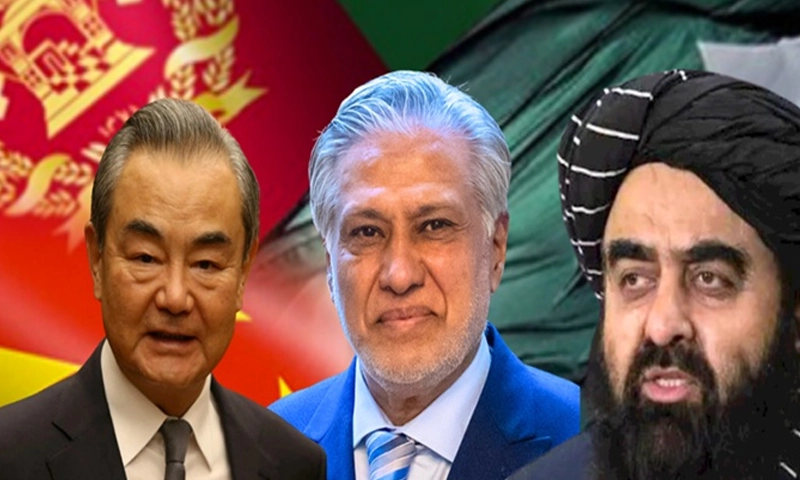- Web Desk
- Feb 19, 2026
Pakistan, China, Afghanistan to hold key Kabul talks tomorrow
-

- Tahir Khan
- Aug 19, 2025

ISLAMABAD: Afghanistan, China and Pakistan will hold a trilateral meeting in Kabul on Wednesday to discuss political, economic and regional cooperation, the Afghan Foreign Ministry announced.
Wang Yi, a member of the Political Bureau of the Communist Party of China Central Committee and Foreign Minister, and Ishaq Dar, Deputy Prime Minister and Foreign Minister of Pakistan, will travel to Kabul to attend a trilateral meeting, an Afghan Foreign Ministry statement said.
The participants of the meeting are expected to exchange views on the future of relations based on common interests, mutual understanding, and broad cooperation, according to the statement.
In addition, the Chinese Foreign Minister will hold comprehensive discussions with a number of senior leaders of the Islamic Emirate of Afghanistan during bilateral meetings on relations, economic cooperation, and further deepening ties based on mutual trust between the two countries.
This would be the sixth China-Afghanistan-Pakistan Trilateral Foreign Ministers’ Dialogue to review decisions made at their informal meeting in Beijing in May this year.
The fifth meeting took place in Islamabad in May 2023. An informal trilateral was held in Beijing in May this year and the Kabul session would hold a follow-up review of the understanding reached in China.
Trump hosts Ukraine peace talks amid uncertainty over next steps
The trilateral mechanism is considered vital for addressing security challenges that pose serious threats to regional and global stability, as well as economic prosperity.
Pakistani sources told Hum News English that security issues would top the agenda as Islamabad will renew its concerns at the increase in violent incidents in Khyber Pakhtunkhwa and Balochistan. Pakistani officials say armed groups fighting security forces have safe havens in Afghanistan. Taliban rulers deny Pakistan’s assertions.
A joint statement issued after the fifth meeting stressed the need to prevent any individual, group, or party including the Tehreek-e-Taliban Pakistan (TTP), the Eastern Turkistan Islamic Movement (ETIM), and others from using any country’s territory for terrorism.
China views ETIM as a direct threat to its security and claims its members are based in Afghanistan. Afghan authorities maintain they do not allow their soil to be used against neighbours or other states.
According to the Pakistan Army, around 50 militants were killed this week in anti-infiltration operations in the Sambaza area of Zhob district, Balochistan, near the Pakistan-Afghanistan border. Pakistani officials have long claimed that armed groups operate from Afghan territory, a stance disputed by the Afghan Taliban.
FM Dar, UK lawyers form task force to back Pakistan on Indus Water Treaty
Launched in 2017, the China-Afghanistan-Pakistan trilateral forum has played a key role in reducing mistrust between Islamabad and Kabul while promoting regional trade and connectivity. In the May meeting in Beijing, ministers agreed to extend the China-Pakistan Economic Corridor (CPEC) into Afghanistan and enhance regional infrastructure development.
Deputy PM Dar said after that meeting that China had expressed interest in financing a strategic railway project linking Uzbekistan to Pakistan via Afghanistan. The framework agreement for a joint feasibility study of the Uzbekistan-Afghanistan-Pakistan (UAP) Railway Project was signed in Kabul in July.
BOOST FOR TALIBAN GOVERNMENT
The meeting is also seen as a diplomatic boost for the Afghan Taliban government, which has been in power since August 2021. In mid-July, Kabul hosted a trilateral with Pakistan’s deputy PM and Uzbekistan’s foreign minister, during which the railway framework agreement was signed.
While only Russia has formally recognised the Taliban government, several countries have increased political engagement with Kabul.




